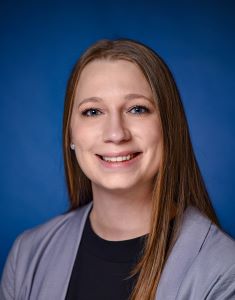 Student Research Spotlight - Kaelyn Fogelman
Student Research Spotlight - Kaelyn Fogelman
Kaelyn Fogelman won first place in the oral presentation category, University-Wide Graduate Student Winners in Science, Technology, Engineering and Mathematics, during the virtual 2021 Auburn Research: Student Symposium.
Hometown: Watsontown, Pennsylvania
Major and degree: Doctorate in Fisheries, Aquaculture and Aquatic Sciences
College: College of Agriculture
Department: School of Fisheries, Aquaculture and Aquatic Sciences
Class year: 2022
Faculty mentor: Jim Stoeckel
Elucidating the Food Web Ecology of Freshwater Mussels (Family: Unionidae) Using Biochemical Markers
What are you researching?
My primary research focuses on the feeding ecology of freshwater unionid mussels. Unionid mussels are one of the most imperiled groups of organisms in North America, and we have little knowledge as to what their food resources are and how they access them. I use stable isotopes and fatty acids to look at the chemistry of the mussel’s tissues and compare that to available food resources to “match” what they are consuming in their environment.
How could the results benefit individuals, agencies or companies?
The findings of my research can be useful for other mussel researchers, conservationists who are doing propagation and relocation efforts, and managers. To hold healthy mussels that we plan to conduct research on, unionid researchers should be able to make sure they are feeding their mussels an adequate diet. One of the key findings of my research is that—across eight mussel species in four rivers and a lake in two states—the mussels are getting the majority of their dietary carbon from benthic as opposed to suspended (planktonic) food resource. This is important because managers should be focusing on what food is available in the bottom of rivers and lakes in addition to the water column.
Tell us why you enjoy research.
I enjoy research because I get to spend every day being a private investigator and solving puzzles. When we collect data and do an analysis, there always seems to be something missing to connect all the pieces together. Diving through the literature and tossing ideas around in my head until the final puzzle piece snaps into place is such a rewarding feeling.
What advice would you give to other students considering doing a research project?
Always remember Murphy’s Law: If it can go wrong while you are conducting an experiment, it will go wrong. Some of the most valuable skills to have as a researcher are problem-solving and being adaptable in the face of adversity. You will have many times when you need to come up with a way to salvage an experiment on the fly when something happens in the field, figure out how to analyze and interpret your data when you have unexpected results, and pick everything up and try again the next day in the face of a power outage or inclement weather.
Tell us about any hobbies or activities you enjoy.
One of my hobbies that led me into my research position is scuba diving. I became a PADI (Professional Association of Diving Instructors) divemaster and AAUS (American Academy of Underwater Sciences) research diver as an undergrad, which led me to the wonders of the aquatic world. Some of my favorite activities in graduate school are outreach and mentoring: I love sharing science and our outdoor world with children, especially young girls and others who are underrepresented in the aquatic sciences.
Back to 2021 Student Research Spotlight homepage


